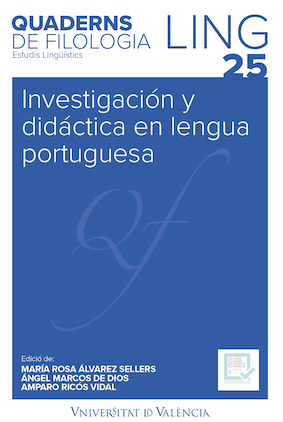Fraseodidàctica. Marcs situacionals per a treballar els Enunciats Fraseològics en la classe de PLE per a hispanoparlants
DOI:
https://doi.org/10.7203/qf.0.19076Paraules clau:
fraseologia portuguesa, enunciats fraseològics, pragmàtica, marcs situacionals, portugués llengua estrangera. Resum
Resum
L'objectiu d'aquest treball és delimitar les funcions pragmàtic-discursives d'alguns dels Enunciats Fraseològics més habituals del portugués, oferint els “marcs situacionals” (Corpas Pastor, 1996) que faran possible la seua comprensió i funcionament per part d'estudiants hispanoparlants. Els “marcs situacionals” que oferim els enquadren en la interacció dinàmica existent entre parlant i oïdor, proporcionant tota la informació necessària per al seu ús: característiques dels participants en la interacció, característiques de l'escenari, la seua motivació, el context –seqüenciació, elements prosòdics, llenguatge no verbal, registre–, variants, sinònims, així com els coneixements socioculturals compartits pels parlants.
 Descàrregues
Descàrregues
Descàrregues
Publicades
Com citar
-
Resum643
-
PDF (Español)448
Número
Secció
Llicència
 Este obra está bajo una licencia de Creative Commons Reconocimiento-NoComercial-SinObraDerivada 4.0 Internacional.
Este obra está bajo una licencia de Creative Commons Reconocimiento-NoComercial-SinObraDerivada 4.0 Internacional.
Tots els documents inclosos a OJS són d'accés lliure i propietat dels seus autors i/o institucions editores, i per tant, qualsevol acte de reproducció, comercialització, comunicació pública o transformació total o parcial necessita el consentiment exprés i escrit d'aquests.
Authors who publish with this journal agree to the following terms:
- Authors retain copyright and grant the journal right of first publication with the work simultaneously licensed under a Creative Commons Attribution License that allows others to share the work with an acknowledgement of the work's authorship and initial publication in this journal.
- Authors are able to enter into separate, additional contractual arrangements for the non-exclusive distribution of the journal's published version of the work (e.g., post it to an institutional repository or publish it in a book), with an acknowledgement of its initial publication in this journal.
- Authors are permitted and encouraged to post their work online (e.g., in institutional repositories or on their website) prior to and during the submission process, as it can lead to productive exchanges, as well as earlier and greater citation of published work (See The Effect of Open Access).



